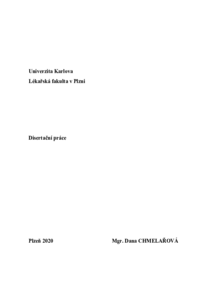Rehabilitace kognitivních funkcí u pacientů s roztroušenou sklerózou
Rehabilitation of Cognitive Functions by Patients with Multiple Sclerosis
rigorózní práce (UZNÁNO)

Zobrazit/
Trvalý odkaz
http://hdl.handle.net/20.500.11956/178257Identifikátory
SIS: 250178
Kolekce
- Kvalifikační práce [24999]
Autor
Fakulta / součást
Filozofická fakulta
Obor
Psychologie
Katedra / ústav / klinika
Katedra psychologie
Datum obhajoby
3. 11. 2022
Nakladatel
Univerzita Karlova, Filozofická fakultaJazyk
Čeština
Známka
Uznáno
Klíčová slova (česky)
roztroušená skleróza|neuropsychologická rehabilitace|pozornost|paměť|kognitivní trénink za pomoci počítačeKlíčová slova (anglicky)
Multiple Sclerosis (MS)|Neuropsychological rehabilitation|Attention|Memory|Computer cognitive trainingCíl: Cílem studie bylo vyhodnotit, zda má dvanácti týdenní neuropsychologická rehabilitace pozitivní vliv na zlepšení kognitivních funkcí a jakými metodami je tento efekt měřitelný. Dále bylo záměrem ověřit vliv zvoleného tréninkového plánu, to znamená zejména jeho frekvence a délky trvání, na výsledný stav kognitivních funkcí. Metodika: bylo randomizováno 43 osob ve věku 33 - 62 let, u kterých byla diagnostikována roztroušená skleróza (RS). Experimentální soubor zahrnoval 26 osob (22 žen a 4 muži) a kontrolní soubor 17 osob (12 žen a 5 mužů). U všech těchto pacientů byl v úvodu studie podrobným psychologickým vyšetřením zjištěn defekt v oblasti kognitivních funkcí. Neuropsychologickými testy byl zjišťován i stav na počátku a při ukončení studie. Experimentální skupina se podrobila rehabilitaci kognitivních funkcí formou tréninku, který probíhal pomocí PC programu v domácím prostředí a to 4x týdně/ 30 minut po dobu osmi po sobě jdoucích týdnů. Celkově tedy proběhlo 32 tréninkových sezení v předem stanovené dny a s přesně zadaným tréninkovým plánem. Stav tréninku byl sledován prostřednictvím webových stránek, na kterých klienti zaznamenávali aktuální stav tréninku. Kontrolní skupina byla bez tréninku. Neuropsychologickými testy v úvodu a na závěr studie byl zjištěn pozitivní efekt tréninku, k...
1 Abstract: Objectives: The purpose of the current study was to evaluate whether a 12-week neuropsychological rehabilitation program has a positive effect on the improvement of cognitive functions and what methods can be used to measure this effect. Furthermore, this study intended to verify the effect of the chosen training plan on the resulting state of cognitive functions, in particular with regard to the frequency and duration of the plan. Methodology: Forty-three patients diagnosed with MS were randomized into an experimental condition or the control group. The experimental condition included 26 patients (22 women and 4 men), whole the control group consisted of 17 patients (12 women and 5 men). All of these patients had a cognitive defect that was assessed at the beginning of the study and monitored using the neuropsychological tests after the participation in the training program. Participants in the experimental group received their rehabilitation of cognitive functions using a PC training program, which they completed in their home environments (30 minutes/4 times per week, for 8 consecutive weeks). Overall, there were 32 training sessions on predetermined days with a specific detailed training plan. The control group received no training. The neuropsychological tests used at the beginning and the...
